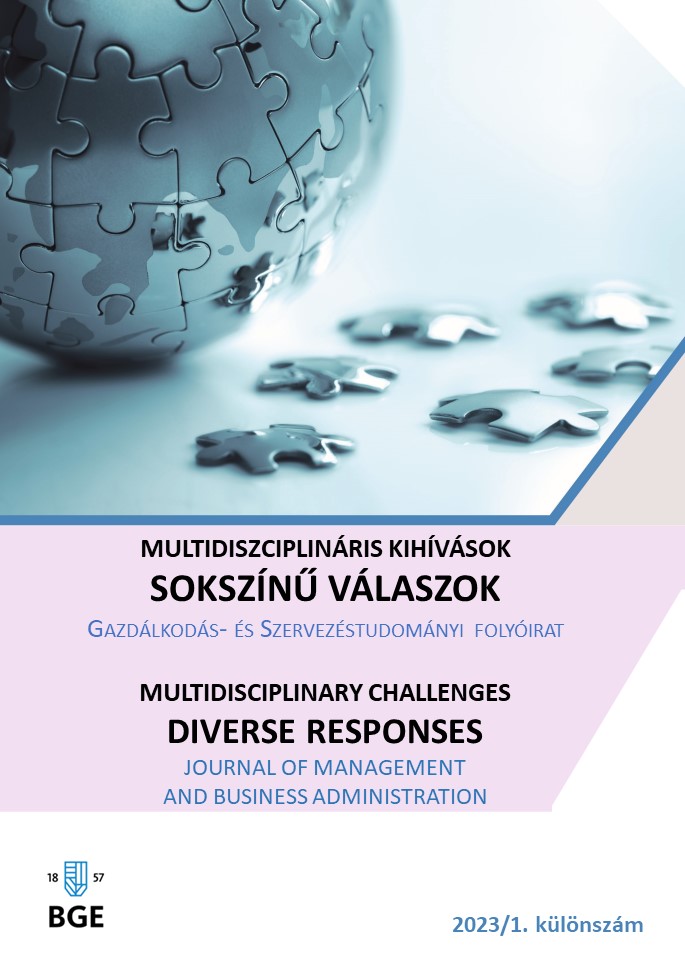Rethinking tourist attractions or community-building traditions in rural tourism
Abstract
The efforts to revive the folk traditions of Hungarian villages played an important role in the definition and attractiveness of rural tourism, which was rebooted during the years of the regime change. The food production activities of the villages were connected to special events, which were tourist attractions for the urbanites from the cities. However, the social and economic development has now resulted in a significant change, and a complete transformation can be observed in both the production of goods and in the related preservation of heritage.
The land ownership of the villages became concentrated in the hands of only a few farmers, while the number of cultivated crops drastically decreased. At the same time, the number of folk traditions related to farming also reduced dramatically. It is therefore justified to consider the rethinking of community-building rural tourism based on village traditions as integrally important. The research results of the last 30 years show that not enough attention has been paid to the folk values of rural tourism. Developments mainly favoured the development of accommodation, and thus the preservation of traditions was pushed into the background.
It is therefore important that this rethinking is followed by sound actions, and that we preserve the natural, spiritual, and cultural heritage left to us by our predecessors. The research aimed at uncovering the gaps and shortcomings that led to the current situation and attempted to find solutions to enhance the survival chances of the successfully rebooted rural tourism. The preservation of the still-living traditions should be treated as a national treasure, which can ensure the touristic appeal of the villages and the continued existence of rural communities based on common thinking! Thematization of the rural tourism offers and more effective marketing activities would generate more tourist arrivals, hence contributing to disadvantaged rural areas catching up and achieving sustainability goals.
References
Berényi, I., 2000. Hungarian agriculture in transformation: spatial aspects. In: Kovács, Z. (ed.) Hungary towards the 21st century - the human geography of transition. Geographical Research Institute of HAS, Budapest. pp. 207–225.
Berényi, I., 2011. Mezőgazdaság. In: Kocsis K. & Schweitzer F. (eds.) Magyarország térképekben. MTA Földrajztudományi Kutatóintézet, Budapest. pp. 148–160.
Brljak, Z., Kőmüves, Zs., Vig, S. S., 2020. Vezetői és beszállítói vélemények a mezőgazdaság és a turizmus összekapcsolódásának lehetőségeiről Zala megyében, Acta Agraria Kaposváriensis, 24 (2), 108–122. https://doi.org/10.31914/AAK.2447
Butler, R. W., 1980. The Concept of a Tourism Area Cycle of Evolution: Implications of Resources Management, The Canadian Geographer, 24 (1), 6-12. https://doi.org/10.1111/j.1541-0064.1980.tb00970.x
Csizmadia, L., 1998. FATOSZ Falusi és agroturizmus stratégiája (2011-2020) https://falusiturizmus.eu/ (Letöltve: 2020. március 14.)
Csizmadia, L., 2001. Falusi (vidéki) turizmus menedzsment. Comitatus. 11. 9., 30–35.
Csizmadia, L., (ed.) 2014. 60 órás akkreditált falusi vendéglátó alapképzés (oktatási segédlet), Falusi és Agroturizmus Országos Szövetsége, n.p.
ec.europa.eu, 2014. Közösségi stratégiai iránymutatások. Elérhetőség: https://enrd.ec.europa.eu/enrd-static/policy-in-action/rural-development-policy-overview/eu-strategic-approach/hu/eu-strategic-approach_hu.html (letöltés dátuma: 2022.06.20)
Fekete, M., 2016. Falusi Turizmus Nemzeti Tanúsító Védjegy – szükséges jó, vagy felesleges pénzkidobás? In: Bernschütz, M., Deés, Sz. & Kenéz, A. (eds.) Marketing esettanulmányok [online], Akadémiai Kiadó, Budapest. Elérhetőség: https://mersz.hu/hivatkozas/dj75me_174 (letöltve 2022 07.04)
Hanusz, Á., 2002. A falusi turizmus elméleti kérdései és fejlesztési lehetőségei Szabolcs-Szatmár-Bereg megyében. Természettudományi Közlemények 2. 127–138.
Hanusz, Á., 2014. Az átalakuló falusi turizmus útkeresése. In: Gál, A. & Kókai, S., (ed.) Tiszteletkötet Dr. Frisnyák Sándor geográfus professzor 80. születésnapjára, Bocskai István Római Katolikus Gimnázium és a Nyíregyházi Főiskola Turizmus-és Földrajztudományi Intézet, Nyíregyháza – Szerencs, pp. 291-300.
Kim, J. H., McCormick, B. & Richie, J. B., 2010. Development of a scale to a measure of memeorable tourism experiences, Journal of Travel Research [online], 51(1), 19-15. Elérhetőség: https://journals.sagepub.com/doi/full/10.1177/0047287510385467
(letöltés dátuma: 2022 07.14)
Kovács, D., 2003a. Falusi vendéglátás Magyarországon, Agroinform Kiadóház, Budapest.
Kovács, D., 2003b. A falusi turizmus hagyományai. Budapest, Mezőgazda Kiadó.
Kovács, D., 2016. Új jelenségek a falusi turizmusban Magyarországon. The central european journal of regional development and tourism Deturope, 8(1), 39-60. https://doi.org/10.32725/det.2016.004
Kulcsár, N., 2013. Fogyasztói értékdimenziók vizsgálata a falusi turizmusban, Doktori (PhD) értekezés, Budapesti Corvinus Egyetem, Gazdálkodástani Doktori Iskola. https://doi.org/10.14267/phd.2013052
Lengyel, M., 2004. A turizmus általános elmélete, Dr. Lengyel Márton és a Heller Farkas Gazdasági és Turisztikai Szolgáltatások Főiskolája, Budapest.
Pályáz.hu, 2019. Magyar Falu Program – önkormányzatok részére. Elérhetőség: https://palyaz.hu/magyar-falu/ (letöltés dátuma: 2022.07.14)
Michalkó, G., 2016. Turizmológia [online], Akadémiai Kiadó, Budapest. Elérhetőség/hozzáférés: https://mersz.hu/dokumentum/dj59t__1/ (letöltés dátuma: 2022 06.20)
Michalkó, G. & Rátz, T., 2005. A kulturális turizmus élmény-gazdaságtani szempontjai. In: Enyedi, Gy. & Keresztély, K. (eds.) A magyar városok kulturális gazdasága [online], MTA Társadalomkutató központ, Budapest. Elérhetőség: https://www.sulinet.hu/oroksegtar/data/ipar_es_gazdasagtortenet/A_magyar_varosok_kulturalis_gazgasaga/ (letöltés dátuma: 2022 07.05)
Molnár, Cs. & Remenyik, B., 2017. A falusi turizmus helyzete és fejlesztési lehetőségei. Studia. Mundi Economica, 4(5) 44-59. https://doi.org/10.18531/studia.mundi.2017.04.05.44-59
mtu.gov.hu, n.a. Kisfaludy Turisztikai Fejlesztési Program. Elérhetőség: https://mtu.gov.hu/cikkek/kisfaludy-turisztikai-fejlesztesi-program-91/ (letöltés dátuma: 2022.07.05)
MTÜ, 2021. Nemzeti Turizmusfejlesztési stratégia 2030. [online] Elérhetőség: https://www.kormany.hu/download/8/19/31000/mtu_kiadvany_EPUB_297x210mm%20-%20preview.pdf (letöltés dátuma: 2022 08.02)
net.jogtar.hu, 239/2009. (X. 20.) Korm. rendelet a szálláshely-szolgáltatási tevékenység folytatásának részletes feltételeiről és szálláshely-üzemeltetési engedély kiadásának rendjéről. Elérhetőség: https://net.jogtar.hu/jogszabaly?docid=a0900239.kor (letöltés dátuma: 2022.05.08)
Puczkó, L., & Rátz, T., 2005. A turizmus hatásai. Budapest: Aula Kiadó
Szabó, G., 2009. A falusi turizmus helyzete és gazdasági kérdései, MTA Társadalomkutató Központ, Budapest.
Szabó, G., 2012. A hazai falusi turizmus helyzete és jövőképe. In: Hanusz Á. (szerk.): A turizmus területei dimenziói. Nyíregyháza


























